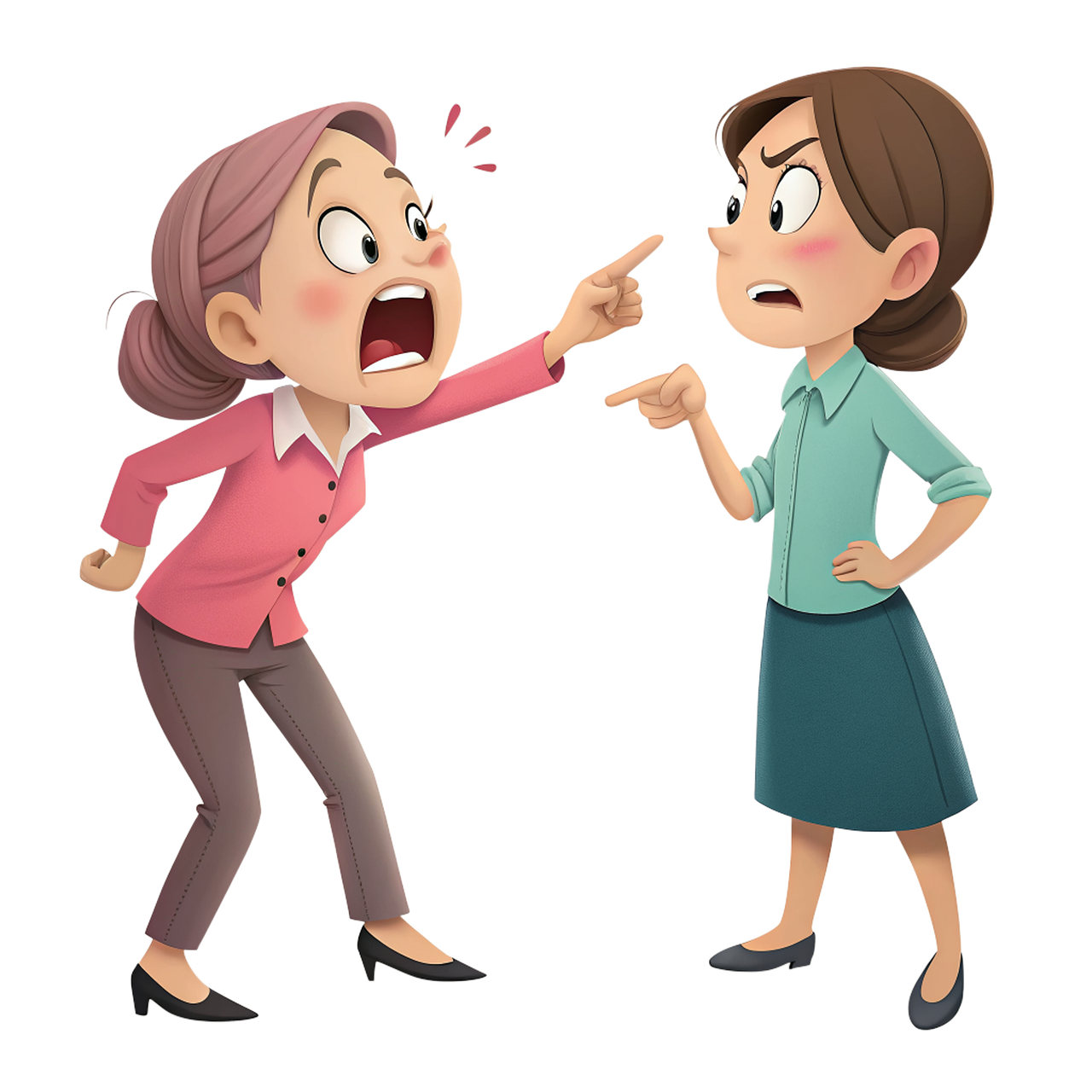How Do You Deal with Negative People at Work and in Your Life?
Let's talk about the people who surround you. They are a part of your environment, the circumstances of your work and life. According to happiness studies, circumstances are responsible for about 10% of your happiness. Therefore, it looks like they are not a significant factor in your happiness.
There is also the myth that happiness is up to the individual, meaning that your happiness depends on you, and you can be happy no matter who is around you. Studies have demonstrated that even if happiness is rooted in the self, your community matters. The happiness of people surrounding you at work and in your personal life influences your long-term happiness.
Think about a situation you had to spend hours among negative and unhappy people, continuously complaining about everything around them and their lives, blaming others and the circumstances. It seemed like people around you were attending a "Who has the most miserable life?" contest. How did you feel? Were you happy and positive, smiling at everybody and talking to them with enthusiasm and optimism? Most likely, not. After a while, you felt drained and tired, and maybe even let yourself be caught in their complaining contest.
The conclusion is that you have to choose carefully the company you keep day by day, but also learn to deal with negative people because you won't always be able to surround yourself with happy, positive people. Even if you change jobs, there is no guarantee that you'll be working only with positive, happy people at the new workplace.
Behaviours of negative people
Negative people are usually easy to recognise.
- They are the people who complain all day long and blame others for anything that happens to them.
- They always expect the worst, catastrophise and can turn a small mishap into a tragedy.
- They criticise everything and nothing is good enough for them, but never offer a solution.
- These people can spoil your day, drain your energy and convince you that life is difficult and a nightmare.
- They shatter your confidence and self-belief, and try to convince you that you are powerless in the face of outside influences and circumstances.
- They always see a danger, a potential evil in everything, everyone and everywhere.
- They caution you not to start something new because it will go wrong anyway, and you will lose everything you have invested.
- Bad news and tragedies are their lifeblood, underpinning and reinforcing their negative vision of the world.
- They are those for whom the glass is always half empty. If you let yourself be pulled into their favourite games of complaining, criticising, gossiping and catastrophising, you can say goodbye to your happiness.
There are three types of negative people. You rarely find a person who fits 100% in one category. Often, negative people are a mixture of these three types, but there is usually a dominant tendency.

The negative types of people are as follows
- "The victims" believe they are the victims of circumstances, the environment and other people. They see every event as an action directed against them and think other people conspire to make their lives difficult. They always complain about the smallest problem they perceive in their lives and, of course, they find somebody and something to blame for it. If something goes wrong, it is always someone else's fault. Because they don't believe there is a way out of a challenging situation, they don't even try to do something about it. Unconsciously, they choose to be angry, desperate, in a bad mood and unhappy. Watching or listening to the news is an important part of their daily routine because it reinforces their negative views of people and the world.
- "The sceptics" pour their negativity on other people by expressing disbelief and negative expectations about everything. They foresee and predict the failure of each new plan and project, and will point out all the possible and impossible problems and obstacles one may encounter in the implementation process, sometimes even falling into catastrophising. They always know why something will not work out and depict with vivid images the difficulties that might occur and stop you from being successful. They are the "it is not possible because …" persons who prefer to stay in their comfort zone and do not aim too high. They avoid starting significant projects because they do not believe them achievable. And they want to convince others to abandon their important projects and goals.
- "The critics" have very high expectations that are practically impossible to match. Nothing is good enough for them. Critics find fault in everything others do. They are never satisfied and always know better than others what should have been done. Looking for and finding mistakes and criticising everything and everyone is their favourite activity. However, you cannot profit from their criticism because they criticise just for the sake of it, and not to give constructive feedback.
In real life, it is not possible to eliminate or exclude completely negative people from your life, whether it is your workplace or personal life. They could be members of your family or circle of friends, relatives, neighbours, your boss, co-workers, project team members, clients, suppliers, etc. Changing jobs very likely won't grant you the luxury of not having negative people around you.
Of course, you are free to choose your friends according to your standards and unfriend negative people. You can change your workplace, hoping you find one where everybody is positive and happy, although this is a rather unrealistic expectation. It is not the best idea to cut all ties with family members and relatives just because they are negative. It is more useful and realistic to decrease the time you spend with non-important or non-relevant people and learn to manage negative people and reduce their influence on your mood.
Steps to deal with negative people
Step 1. Recognise the negative people in your life!
Map all the negative people you regularly meet in your environment. First, brainstorm a list of negative people you are surrounded by at work. Then fit them into one of the three categories of negative people. When categorising a person, look at their dominant negative behaviours. This exercise is best performed on three sheets of paper, one for each category of negative persons. Draw four columns on each sheet of paper:
- the first for the names;
- the second for the relationship you have with each person (co-worker, boss, project team members, client, etc.);
- the third for the estimated amount of time you spend with each person (for example, on average per day, week or month, expressed in minutes, hours or percentage of the time);
- the fourth column for actions to take.
Step 2. When possible, end the relationship with a negative person.
You cannot end your relationship with all the negative people in your life because you are bound emotionally, professionally or in other ways to some of them. But there are people to whom you can say farewell without any serious consequences if their behaviour bothers you, for example, clients, if you own your company or are a freelancer, or acquaintances and friends in your private life. They can belong to any of the three categories of negative people. They all poison your life and lower your energy levels in some ways. Who could you exclude from your life without any negative consequences to you? You should take into account your own interests. Don't let yourself be influenced by questions such as "What will others say?" or "Will they judge me?".
Go through your workplace list first and decide whom you can stop your relationship with. Look at the potential negative consequences of putting an end to the relationship. If the person is the most productive member of your team, you have to take into consideration the problems created within the team by this person's negativity. If you are a freelancer with an extremely negative client, consider whether you can afford to lose the income brought in by this client.
Do the same exercise with your private life list.
Step 3. Reduce the intensity of your relationship with negative people you cannot exclude from your life.
There are many people you cannot exclude from your life. They can be close family members, coworkers or your boss. You could feel that each meeting with that person lowers your energy level. They might make you feel inadequate, doubt your own decisions or want to convince you to give up on your goals and stay in your safe comfort zone. Or, your discussions usually end in an argument.
You can limit the number of meetings with these persons or shorten your meetings. And most importantly, learn to handle negative people.
This strategy is less suitable at work when you have to collaborate regularly with a negative person due to the nature of your tasks or the work process itself.
Step 4. Learn to handle negative people.
You will not be able to exclude all the negative people from your life; therefore, you must learn to handle them. Here are some tips:
- Be aware of your feelings; recognise and acknowledge when you don't feel well and get into a negative mood. If you cannot leave the situation, do some inner exercises to change your mood.
- Change the way you communicate with them. Accept their opinion, but do not add to it or do not try to explain to them that they are wrong in their negative opinion.
- Do not argue with negative persons, especially not with "victims". Do not try to convince them that they are not victims and that they could do something about the situation. For any suggestion you make, they will find a lot of arguments to demonstrate that your suggestion is impossible to carry out.
- In the case of "sceptics" and "critics", avoid sensitive personal subjects such as your goals and plans. If they start telling you anyway about why something isn't possible or start criticising something you have done or intend to do, thank them for pointing out potential dangers, problems, mistakes and faults, and tell them you will think about them. Do not start explaining your decisions or why their remarks and criticisms are incorrect, because it will lead to an argument. However, listening to the negative opinions of "critics" and "sceptics" without getting emotionally involved or taking it personally might help you in the planning process, for example, regarding potential risks and preparing to mitigate them.
- If "critics" start bombarding you with criticism about a certain situation that does not concern you directly, listen to them, nod, showing that you are listening and then thank them for sharing their opinion. If it is necessary, for example, in a work situation, put forward your opinion calmly and firmly. If it is not required to discuss the subject, finish the conversation as soon as possible.
- Don't get angry or let yourself be involved in an argument. If you feel negative emotions rising and cannot end the conversation, do a short mental exercise to release stress or mentally repeat a positive affirmation.
Journaling questions to reflect on negative people to decide the best course of action, and for self-development:
- Who are the most negative people in your environment?
- What is their dominant tendency to negativity?
- Pick the most bothersome negative person at work and analyse his/her effect on you:
- What is their tendency to negativity (criticising, playing the victim and complaining or expressing their disbelief and doubt about a goal, plan or project)?
- How do you react to their negativity?
- How often do you let them pull you into their negative social games?
- How do you feel after an interaction?
- Can you end the relationship with that person without any negative consequences?
- How can you reduce the time spent with these negative people?
- What can you learn about yourself from these relationships? What triggers you?
- How can you counteract or stop their negative influence?

